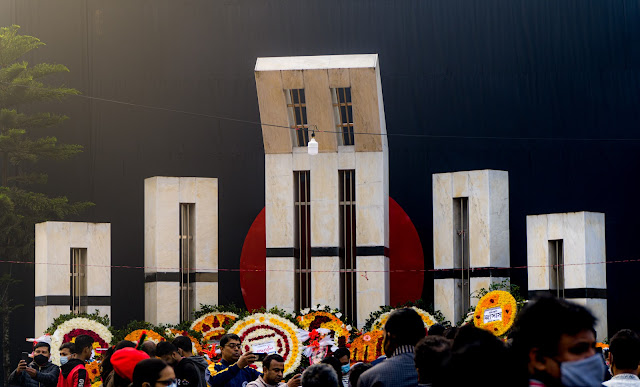Language day
In 1952, the emerging middle classes of East Bengal underwent an uprising known later as the Bangla Language Movement. Bangladeshis (then East Pakistanis) were initially agitated by a decision by the Central Pakistan Government to establish Urdu, a minority language spoken only by the supposed elite class of West Pakistan, as the sole national language for all of Pakistan. The situation was worsened by an open declaration that "Urdu and only Urdu will be the national language of Pakistan" by the governor, Khawaja Nazimuddin. Police declared Section 144 which banned any sort of meeting. Defying this, the students of the University of Dhaka and Dhaka Medical College and other political activists started a procession on 21 February 1952. Near the current Dhaka Medical College Hospital, police fired on the protesters and numerous people, including Abdus Salam, Rafiq Uddin Ahmed, Sofiur Rahman, Abul Barkat, and Abdul Jabbar died. The movement spread to the whole of East Pakistan and the whole province came to a standstill. Afterward, the Government of Pakistan relented and gave Bengali equal status as a national language. This movement is thought to have sown the seeds for the independence movement which resulted in the liberation of Bangladesh in 1971. To commemorate this movement, Shaheed Minar, a solemn and symbolic sculpture, was erected in the place of the massacre. The day is revered in Bangladesh and, to a somewhat lesser extent, in West Bengal as the Martyrs' Day. This day is the public holiday in Bangladesh. UNESCO decided to observe 21 February as International Mother Language Day. The UNESCO General Conference took a decision that took effect on 17 November 1999 when it unanimously adopted a draft resolution submitted by Bangladesh and co-sponsored and supported by 28 other countries.
ভাষা দিবস
১৯৫২ সালে, পূর্ব বাংলার উদীয়মান মধ্যবিত্তরা একটি বিদ্রোহের মধ্য দিয়ে যায় যা পরবর্তীতে বাংলা ভাষা আন্দোলন নামে পরিচিত। বাংলাদেশিরা (তৎকালীন পূর্ব পাকিস্তানীরা) প্রাথমিকভাবে উর্দুকে প্রতিষ্ঠা করার সিদ্ধান্তে উত্তেজিত হয়েছিল, যেটি শুধুমাত্র পশ্চিম পাকিস্তানের কথিত অভিজাত শ্রেণীর দ্বারা কথিত সংখ্যালঘু ভাষা, সমগ্র পাকিস্তানের একমাত্র জাতীয় ভাষা হিসাবে। গভর্নর খাজা নাজিমুদ্দিনের "উর্দু এবং শুধুমাত্র উর্দুই হবে পাকিস্তানের জাতীয় ভাষা" এই প্রকাশ্য ঘোষণার মাধ্যমে পরিস্থিতি আরও খারাপ হয়েছিল। পুলিশ ১৪৪ ধারা জারি করেছে যা যেকোনো ধরনের সভা নিষিদ্ধ করেছে। তা অস্বীকার করে ১৯৫২ সালের ২১ ফেব্রুয়ারি ঢাকা বিশ্ববিদ্যালয় ও ঢাকা মেডিকেল কলেজের ছাত্ররা এবং অন্যান্য রাজনৈতিক কর্মীরা মিছিল শুরু করে। বর্তমান ঢাকা মেডিকেল কলেজ হাসপাতালের কাছে পুলিশ আন্দোলনকারীদের ওপর গুলি চালায় এবং আব্দুস সালাম, রফিক উদ্দিন আহমেদসহ অসংখ্য মানুষ। , সফিউর রহমান, আবুল বরকত ও আব্দুল জব্বার মারা গেছেন। আন্দোলন সমগ্র পূর্ব পাকিস্তানে ছড়িয়ে পড়ে এবং পুরো প্রদেশে স্থবির হয়ে পড়ে। পরবর্তীতে, পাকিস্তান সরকার নতজানু হয়ে বাংলাকে জাতীয় ভাষার সমান মর্যাদা দেয়। এই আন্দোলন স্বাধীনতা আন্দোলনের বীজ বপন করেছিল বলে মনে করা হয় যার ফলশ্রুতিতে ১৯৭১ সালে বাংলাদেশ স্বাধীন হয়েছিল। দিনটি বাংলাদেশে এবং কিছুটা কম পরিমাণে, পশ্চিমবঙ্গে শহীদ দিবস হিসাবে সম্মানিত হয়। এই দিনটি বাংলাদেশে সরকারি ছুটির দিন। ইউনেস্কো ২১ ফেব্রুয়ারিকে আন্তর্জাতিক মাতৃভাষা দিবস হিসেবে পালনের সিদ্ধান্ত নেয়। ইউনেস্কোর সাধারণ সম্মেলন একটি সিদ্ধান্ত নেয় যা ১৭ নভেম্বর ১৯৯৯ তারিখে কার্যকর হয় যখন এটি সর্বসম্মতিক্রমে বাংলাদেশের দ্বারা জমা দেওয়া একটি খসড়া প্রস্তাব গ্রহণ করে এবং অন্যান্য 28টি দেশ সহ-স্পন্সর এবং সমর্থন করে।





_Ranthambhore_India_12.10.2014.jpg)



.png)





0 comments:
Post a Comment